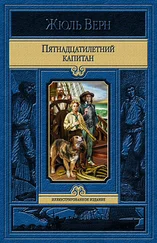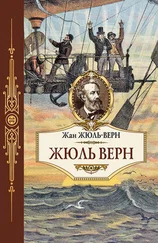In quick time an artillery-wagon was on the spot, and the men lifted out a full-sized shot, weighing 200 lbs., which, under ordinary circumstances, the cannon would carry about four miles. It was proposed, by means of telescopes, to note the place where the ball first touched the water, and thus to obtain an approximation sufficiently accurate as to the true range.
Having been duly charged with powder and ball, the gun was raised to an angle of something under 45 degrees, so as to allow proper development to the curve that the projectile would make, and, at a signal from the major, the light was applied to the priming.
"Heavens!" "By all that’s good!" exclaimed both officers in one breath, as, standing open-mouthed, they hardly knew whether they were to believe the evidence of their own senses. "Is it possible?"
The diminution of the force of attraction at the earth’s surface was so considerable that the ball had sped beyond the horizon.
"Incredible!" ejaculated the colonel.
"Incredible!" echoed the major.
"Six miles at least!" observed the one.
"Ay, more than that!" replied the other.
Awhile, they gazed at the sea and at each other in mute amazement. But in the midst of their perplexity, what sound was that which startled them? Was it mere fancy? Was it the reverberation of the cannon still booming in their ears? Or was it not truly the report of another and a distant gun in answer to their own? Attentively and eagerly they listened. Twice, thrice did the sound repeat itself. It was quite distinct. There could be no mistake.
"I told you so," cried the colonel, triumphantly. "I knew our country would not forsake us; it is an English ship, no doubt."
In half an hour two masts were visible above the horizon. "See! Was I not right? Our country was sure to send to our relief. Here is the ship."
"Yes," replied the major; "she responded to our gun."
"It is to be hoped," muttered the corporal, "that our ball has done her no damage."
Before long the hull was full in sight. A long trail of smoke betokened her to be a steamer; and very soon, by the aid of the glass, it could be ascertained that she was a schooner-yacht, and making straight for the island. A flag at her mast-head fluttered in the breeze, and towards this the two officers, with the keenest attention, respectively adjusted their focus.
Simultaneously the two telescopes were lowered. The colonel and the major stared at each other in blank astonishment. "Russian!" they gasped.
And true it was that the flag that floated at the head of yonder mast was the blue cross of Russia.
Chapter XIV
Sensitive Nationality
When the schooner had approached the island, the Englishmen were able to make out the name " Dobryna " painted on the aft-board. A sinuous irregularity of the coast had formed a kind of cove, which, though hardly spacious enough for a few fishing-smacks, would afford the yacht a temporary anchorage, so long as the wind did not blow violently from either west or south. Into this cove the Dobryna was duly signaled, and as soon as she was safely moored, she lowered her four-oar, and Count Timascheff and Captain Servadac made their way at once to land.
Colonel Heneage Finch Murphy and Major Sir John Temple Oliphant stood, grave and prim, formally awaiting the arrival of their visitors. Captain Servadac, with the uncontrolled vivacity natural to a Frenchman, was the first to speak.
"A joyful sight, gentlemen!" he exclaimed. "It will give us unbounded pleasure to shake hands again with some of our fellow-creatures. You, no doubt, have escaped the same disaster as ourselves."
But the English officers, neither by word nor gesture, made the slightest acknowledgment of this familiar greeting.
"What news can you give us of France, England, or Russia?" continued Servadac, perfectly unconscious of the stolid rigidity with which his advances were received. "We are anxious to hear anything you can tell us. Have you had communications with Europe? Have you—"
"To whom have we the honor of speaking?" at last interposed Colonel Murphy, in the coldest and most measured tone, and drawing himself up to his full height.
"Ah! how stupid! I forgot," said Servadac, with the slightest possible shrug of the shoulders; "we have not been introduced."
Then, with a wave of his hand towards his companion, who meanwhile had exhibited a reserve hardly less than that of the British officers, he said:
"Allow me to introduce you to Count Wassili Timascheff."
"Major Sir John Temple Oliphant," replied the colonel.
The Russian and the Englishman mutually exchanged the stiffest of bows.
"I have the pleasure of introducing Captain Servadac," said the count in his turn.
"And this is Colonel Heneage Finch Murphy," was the major’s grave rejoinder.
More bows were interchanged and the ceremony brought to its due conclusion. It need hardly be said that the conversation had been carried on in French, a language which is generally known both by Russians and Englishmen—a circumstance that is probably in some measure to be accounted for by the refusal of Frenchmen to learn either Russian or English.
The formal preliminaries of etiquette being thus complete, there was no longer any obstacle to a freer intercourse. The colonel, signing to his guests to follow, led the way to the apartment occupied jointly by himself and the major, which, although only a kind of casemate hollowed in the rock, nevertheless wore a general air of comfort. Major Oliphant accompanied them, and all four having taken their seats, the conversation was commenced.
Irritated and disgusted at all the cold formalities, Hector Servadac resolved to leave all the talking to the count; and he, quite aware that the Englishmen would adhere to the fiction that they could be supposed to know nothing that had transpired previous to the introduction felt himself obliged to recapitulate matters from the very beginning.
"You must be aware, gentlemen," began the count, "that a most singular catastrophe occurred on the 1st of January last. Its cause, its limits we have utterly failed to discover, but from the appearance of the island on which we find you here, you have evidently experienced its devastating consequences."
The Englishmen, in silence, bowed assent.
"Captain Servadac, who accompanies me," continued the count, "has been most severely tried by the disaster. Engaged as he was in an important mission as a staff-officer in Algeria—"
"A French colony, I believe," interposed Major Oliphant, half shutting his eyes with an expression of supreme indifference.
Servadac was on the point of making some cutting retort, but Count Timascheff, without allowing the interruption to be noticed, calmly continued his narrative:
"It was near the mouth of the Shelif that a portion of Africa, on that eventful night, was transformed into an island which alone survived; the rest of the vast continent disappeared as completely as if it had never been."
The announcement seemed by no means startling to the phlegmatic colonel.
"Indeed!" was all he said.
"And where were you?" asked Major Oliphant.
"I was out at sea, cruising in my yacht; hard by; and I look upon it as a miracle, and nothing less, that I and my crew escaped with our lives."
"I congratulate you on your luck," replied the major.
The count resumed: "It was about a month after the great disruption that I was sailing—my engine having sustained some damage in the shock—along the Algerian coast, and had the pleasure of meeting with my previous acquaintance, Captain Servadac, who was resident upon the island with his orderly, Ben Zoof."
"Ben who?" inquired the major.
"Zoof! Ben Zoof!" ejaculated Servadac, who could scarcely shout loud enough to relieve his pent-up feelings.
Читать дальше
![Жюль Верн Off on a Comet [Hector Servadac] обложка книги](/books/30131/zhyul-vern-off-on-a-comet-hector-servadac-cover.webp)










![Жюль Верн - Властелин мира [сборник]](/books/407848/zhyul-vern-vlastelin-mira-sbornik-thumb.webp)
